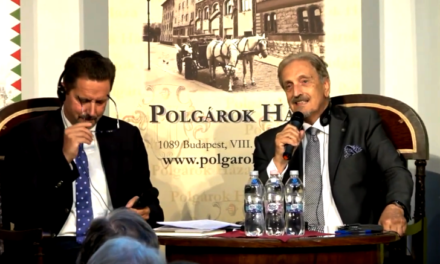It is unacceptable that market participants use all kinds of manipulative means to maintain the appearance that a product has not become more expensive, while it has become more expensive due to the change in the price/value ratio.
The last Civil Academy turned out to be somewhat unusual, given that the original speaker, Gábor G. Fodor, was unable to fulfill the invitation due to a regrettable sports accident, but the "drop-in couple", economist Imre Boros and economist and government commissioner György László, did not disappoint either for those interested. A particularly exciting part of their conversation was the discussion of how to combat the exceptionally high inflation in Hungary.
László György views this as follows:
In the past 13 years, since the Orbán government has been leading the country, real wages have increased every year, and those who worked for it, worked, and trained themselves, were able to advance practically every year. This is the first year that inflation has eaten into that opportunity. Therefore, the primary priority is the fight against inflation.
At the same time, we also have to deal with such "clever" solutions as the so-called shrink inflation.
This means that the price of some products does not change, but the content is getting smaller. Such manipulation is well exemplified by an anecdote from the 1950s. According to this, someone pointed out to Comrade Marosán that they had promised that the buns would not be more expensive. It didn't even become, but it is much smaller than it was.
To this Comrade Marosán replied: It's not the bun that got smaller, but your mouths got bigger, comrades.
It is unacceptable that market participants use all kinds of manipulative means to maintain the appearance that a product has not become more expensive, while it has become more expensive due to the change in the price/value ratio. So it is expected that measures will be taken in this regard, as well as in relation to the restoration of economic growth. The price monitoring system plays a big role in the fight against inflation, and we also draw attention to hidden price increases.
Imre Boros approached inflation from a slightly different angle, from a financial point of view:
Inflation is a problem in general, Hungarian inflation in particular, including the rise in food prices. There is no reasonable explanation as to why food inflation in Hungary was twice as high as in Germany. I would compare this phenomenon to a fever. A fever indicates some kind of trouble, in order to eliminate it, it is necessary to find out what is causing it. This is also the case with inflation.
I would mention three factors: the banking system, the energy supply, especially the fuel supply, and the third, which is apparently of minor importance, but has stubbornly been with us for 60 years or so, this is the monopolized situation of the fruit and vegetable market.
These have to be dealt with, because if the inflationary pressure does not go down, then the interest rates do not want to go down either. No matter what the National Bank tries to do, it cannot bring down inflation on its own.
Let's look at the banking system!
Not long after the regime change, the Antall government consolidated the banking system, i.e. recapitalized the banks without capital. That's what the socialists and György Surányi came to, he gave the banks to foreigners almost for free, we don't even know how much the purchase price was. In addition, the bankers carefully discussed what the service costs would be, which are still quite high. How much should the withdrawal and transfer cost, how much should the deposit and lending interest be, the difference between the two. This should also be dealt with.
The other is fuel. It was the Orbán government that "rescued" the national oil company from the clutches of foreigners, but thus the Hungarian state became a part owner and also a regulator.
This is quite a controversial situation, and the company uses it to its advantage. Many people say that Hungarian fuel prices should not be higher than in neighboring countries. I say why not lower? Then everyone would come here to refuel, so we go over to them. Not to mention the two million trucks that pass through us every year. They usually refuel 6-8 thousand liters and this would bring serious tax revenue. And with more traffic, the profit would also come.
The third item is the vegetable and fruit market, which has been fairly monopolized for 60-70 years. The slightly older generation has not yet forgotten how this area worked under socialism. The goods had to be brought up to Budapest, because this is where they were distributed to the Greens.
Then a company settled on this system, and now they decide both the buying and selling prices.
This area should also be transformed into a competitive market area. And if we can remedy these problems mentioned above, then the fever will go down and it would be much easier to deal with inflation.
Featured image: civilek.info












